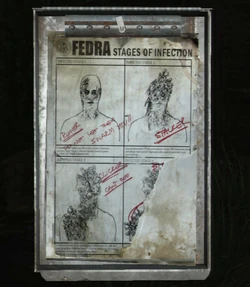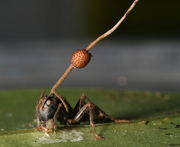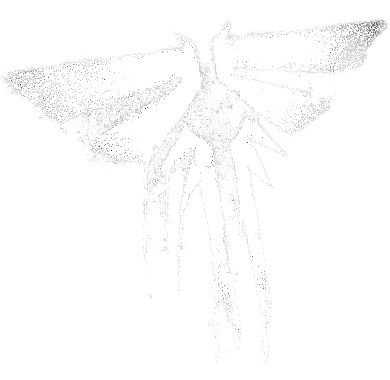No edit summary Tags: Visual edit apiedit |
(Undo revision 84250 by 96.255.192.188 (talk)) |
||
| (30 intermediate revisions by 19 users not shown) | |||
| Line 1: | Line 1: | ||
[[File:Military Pamphlet.png|thumb|250px|A [[Military Pamphlet]] that outlines the stages of infection.]] |
[[File:Military Pamphlet.png|thumb|250px|A [[Military Pamphlet]] that outlines the stages of infection.]] |
||
| ⚫ | |||
| + | {{Quote|The antigenic titers of the patient's cordyceps remain high in both the serum and the cerebrospinal fluid. Blood cultures taken from the patient rapidly grow cordyceps in fungal-media in the lab.|The [[Head Surgeon]] discussing the Cordyceps Brain Infection<ref>[[Surgeon's Recorder]]</ref>}} |
||
| ⚫ | |||
| ⚫ | |||
| ⚫ | |||
| ⚫ | In ''The Last of Us, ''the infection began to spread in the United States in late September 2013. In |
||
| ⚫ | |||
| ⚫ | |||
| ⚫ | In ''The Last of Us, ''the infection began to spread in the United States in late September 2013. In several months, roughly 60% of humanity was either killed or infected by the cordyceps fungus,<ref>[[Newspaper Clipping]]</ref> later medically referred to as Cordyceps Brain Infection.<ref>[[Medical Pamphlet]]</ref> |
||
| ⚫ | The fungus grows while the host is still alive, with hosts undergoing four stages of infection. Stage one begins within two days since infection, wherein the [[The Infected|host]] loses their higher brain function (and with it, their humanity), rendering them hyper-aggressive and incapable of reason or rational thought. Within two weeks, the host enters stage two of the infection, wherein the fungus begins altering their sight as a result of progressing fungal growth over the head and corruption of their visual cortex. After a year of infection, the infection enters stage three later; the infection scarring their face and blinds them, resulting in them developing a primitive form of echolocation to compensate. In very rare cases, if the host survives for over a decade, they reach stage four. They develop hardened fungal plates over most of their body. When the fungus kills the host, the host's body grows stalk-like fungal projections which release infectious spores. The infection can also be spread through bites from living hosts. Hosts can only be infected while alive, as the fungus is unable to infect dead bodies due to its parasitic nature, though dead Infected can release spores regardless of stage. |
||
| ⚫ | |||
| ⚫ | |||
| ⚫ | The infection seems unable to spread in open air areas, such as the countryside, although some of these areas such as Lincoln and a suburban neighborhood in Pittsburgh |
||
| + | |||
| ⚫ | The infection seems unable to spread in open air areas, such as the countryside, although some of these areas (such as Lincoln and a suburban neighborhood in Pittsburgh) possess a high population of Infected. The infection mostly thrives in underground or enclosed areas commonly avoided by people, especially sewers, subway tunnels, and some buildings. |
||
In the ''[[The Last of Us: Left Behind|Left Behind]]'' DLC, during her search for medical supplies, Ellie discovers that an attempt was made by [[Regan Francis|Captain Regan Francis]] to stop the infection from spreading throughout the body of her fellow [[Survivors|survivor]] [[Eugene Ellis|Private Eugene Ellis]] by quickly amputating his bitten right arm.<ref>[[Atrium Note]]</ref> Francis chose not to follow the military's Infection Protocol to kill Ellis after having already killed Officer Larry Caulfield when it was discovered he was bitten earlier.<ref>[[Salon Note]], [[Generator Note]]</ref> It is implied that the amputation may have stopped Ellis from becoming infected, but not knowing the future consequences of Regan's actions had made both of them doubtful of whether this course of action was right or wrong. <ref>[[Atrium Recorder]]</ref> Ellis later shot Regan dead out of fear that she would kill him, and later bled out in an air duct after escaping from some Infected.<ref>[[Duct Recorder]]</ref> |
In the ''[[The Last of Us: Left Behind|Left Behind]]'' DLC, during her search for medical supplies, Ellie discovers that an attempt was made by [[Regan Francis|Captain Regan Francis]] to stop the infection from spreading throughout the body of her fellow [[Survivors|survivor]] [[Eugene Ellis|Private Eugene Ellis]] by quickly amputating his bitten right arm.<ref>[[Atrium Note]]</ref> Francis chose not to follow the military's Infection Protocol to kill Ellis after having already killed Officer Larry Caulfield when it was discovered he was bitten earlier.<ref>[[Salon Note]], [[Generator Note]]</ref> It is implied that the amputation may have stopped Ellis from becoming infected, but not knowing the future consequences of Regan's actions had made both of them doubtful of whether this course of action was right or wrong. <ref>[[Atrium Recorder]]</ref> Ellis later shot Regan dead out of fear that she would kill him, and later bled out in an air duct after escaping from some Infected.<ref>[[Duct Recorder]]</ref> |
||
==Trivia== |
==Trivia== |
||
| − | [[File:Cordyceps on ant.png|thumb| |
+ | [[File:Cordyceps on ant.png|thumb|A bullet ant infected with ''Ophiocordyceps unilateralis'', as shown in the "Jungles" episode of BBC's ''Planet Earth''.]] |
| − | *An episode of the BBC documentary ''Planet Earth'' |
+ | *An episode of the BBC documentary ''Planet Earth'' titled "Jungles", narrated by Sir David Attenborough, features an infected ant being killed by ''Ophiocordyceps unilateralis'', as well as showing a variety of other insects and arachnids that were killed by different species of the fungus. This scene partially inspired the development of ''The Last of Us''. |
| − | *Seemingly, spores will always be abundant in areas with low human activity. This is most likely because without human intervention in infected population, some infected will die off before Stage 3-4 and release spores. If they are killed before said stages, this may stop the process. |
+ | *Seemingly, spores will always be abundant in areas with low human activity. This is most likely because, without human intervention in the infected population, some infected will die off before Stage 3-4 and release spores. If they are killed before said stages, this may stop the process. |
*Cordyceps spores can be seen blowing away as a loading screen when booting up the game. Spores are also plainly visible in the air. |
*Cordyceps spores can be seen blowing away as a loading screen when booting up the game. Spores are also plainly visible in the air. |
||
| − | *It is stated in a newspaper |
+ | *It is stated in a newspaper found in Joel and Sarah's house at the beginning of the game that the Cordyceps outbreak spread to humans due to infected crops from South America. In fact, the local newspaper of the city of Austin, the Texas Herald states on the front page of the September 28th edition: “Admittance spikes at area hospitals! 300% increase due to mysterious infection” followed by the article “FDA expands the list of contaminated crops. Massive recalls anticipated” saying: |
| + | “The Food and Drug Administration’s investigation of crops potentially tainted with mold continues across the country. Initial lists distributed to vendors nationwide warned against crops imported from South America, but now the scope has extended to include Central America and Mexico. Several companies have already voluntarily recalled their food products from the shelves.” |
||
| − | *Despite the ''CBI'' being based and classified from the [[wikipedia:Cordyceps|cordyceps]] as a pathogen under the 'fungi' class, in reality, it is only fatal to insects rather than humans. In the game however, a mutated variant of the fungi becomes an epidemic which acts as both |
+ | *Despite the ''CBI'' being based and classified from the [[wikipedia:Cordyceps|cordyceps]] as a pathogen under the 'fungi' class, in reality, it is only fatal to insects rather than humans. In the game, however, a mutated variant of the fungi becomes an epidemic which acts as both infectious fungi and a plague. The cordyceps itself is considered mutated by a certain 'virus', somewhat like a bacteriophage (a virus which infects and replicates within bacteria) does. Like the description, a mutated cordyceps infection could have a horrendous effect on its host and rather, killing them from the inside, like bacteriophages. |
| − | **In reality, it is quite impossible for humans to be fatally infected by the ''Ophiocordyceps '' |
+ | **In reality, it is quite impossible for humans to be fatally infected by the ''Ophiocordyceps ''genera but may undergo behavioral change or 'disorder'. Since humans are easier to dissect (in terms of removing foreign substances or matter) than insects (also body size can also have a different outcome for the infection), normal cordyceps would take weeks or months for it to be fatal. |
| ⚫ | |||
==Videos== |
==Videos== |
||
| Line 29: | Line 32: | ||
</gallery> |
</gallery> |
||
| − | [[de:Ophiocordyceps unilateralis]] |
+ | [[de:Ophiocordyceps unilateralis|de: Ophiocordyceps unilateralis]] |
==References== |
==References== |
||
| − | <references /> |
+ | <references />[[Category:The Last of Us]] |
| − | [[Category:The Last of Us]] |
||
Revision as of 20:13, 20 October 2019

A Military Pamphlet that outlines the stages of infection.
| “ | The antigenic titers of the patient's cordyceps remain high in both the serum and the cerebrospinal fluid. Blood cultures taken from the patient rapidly grow cordyceps in fungal-media in the lab.
―The Head Surgeon discussing the Cordyceps Brain Infection[1]
|
” |
The Cordyceps Brain Infection (abbreviated as CBI) is a parasitic fungal infection that has devastated mankind in The Last of Us.
Events of The Last of Us
In The Last of Us, the infection began to spread in the United States in late September 2013. In several months, roughly 60% of humanity was either killed or infected by the cordyceps fungus,[2] later medically referred to as Cordyceps Brain Infection.[3]
The fungus grows while the host is still alive, with hosts undergoing four stages of infection. Stage one begins within two days since infection, wherein the host loses their higher brain function (and with it, their humanity), rendering them hyper-aggressive and incapable of reason or rational thought. Within two weeks, the host enters stage two of the infection, wherein the fungus begins altering their sight as a result of progressing fungal growth over the head and corruption of their visual cortex. After a year of infection, the infection enters stage three later; the infection scarring their face and blinds them, resulting in them developing a primitive form of echolocation to compensate. In very rare cases, if the host survives for over a decade, they reach stage four. They develop hardened fungal plates over most of their body. When the fungus kills the host, the host's body grows stalk-like fungal projections which release infectious spores. The infection can also be spread through bites from living hosts. Hosts can only be infected while alive, as the fungus is unable to infect dead bodies due to its parasitic nature, though dead Infected can release spores regardless of stage.
To protect themselves from airborne spores, survivors wear gas masks; Joel has one strapped to his hip as does Tess. Those who are immune do not need them, namely Ellie.
The infection seems unable to spread in open air areas, such as the countryside, although some of these areas (such as Lincoln and a suburban neighborhood in Pittsburgh) possess a high population of Infected. The infection mostly thrives in underground or enclosed areas commonly avoided by people, especially sewers, subway tunnels, and some buildings.
In the Left Behind DLC, during her search for medical supplies, Ellie discovers that an attempt was made by Captain Regan Francis to stop the infection from spreading throughout the body of her fellow survivor Private Eugene Ellis by quickly amputating his bitten right arm.[4] Francis chose not to follow the military's Infection Protocol to kill Ellis after having already killed Officer Larry Caulfield when it was discovered he was bitten earlier.[5] It is implied that the amputation may have stopped Ellis from becoming infected, but not knowing the future consequences of Regan's actions had made both of them doubtful of whether this course of action was right or wrong. [6] Ellis later shot Regan dead out of fear that she would kill him, and later bled out in an air duct after escaping from some Infected.[7]
Trivia

A bullet ant infected with Ophiocordyceps unilateralis, as shown in the "Jungles" episode of BBC's Planet Earth.
- An episode of the BBC documentary Planet Earth titled "Jungles", narrated by Sir David Attenborough, features an infected ant being killed by Ophiocordyceps unilateralis, as well as showing a variety of other insects and arachnids that were killed by different species of the fungus. This scene partially inspired the development of The Last of Us.
- Seemingly, spores will always be abundant in areas with low human activity. This is most likely because, without human intervention in the infected population, some infected will die off before Stage 3-4 and release spores. If they are killed before said stages, this may stop the process.
- Cordyceps spores can be seen blowing away as a loading screen when booting up the game. Spores are also plainly visible in the air.
- It is stated in a newspaper found in Joel and Sarah's house at the beginning of the game that the Cordyceps outbreak spread to humans due to infected crops from South America. In fact, the local newspaper of the city of Austin, the Texas Herald states on the front page of the September 28th edition: “Admittance spikes at area hospitals! 300% increase due to mysterious infection” followed by the article “FDA expands the list of contaminated crops. Massive recalls anticipated” saying:
“The Food and Drug Administration’s investigation of crops potentially tainted with mold continues across the country. Initial lists distributed to vendors nationwide warned against crops imported from South America, but now the scope has extended to include Central America and Mexico. Several companies have already voluntarily recalled their food products from the shelves.”
- Despite the CBI being based and classified from the cordyceps as a pathogen under the 'fungi' class, in reality, it is only fatal to insects rather than humans. In the game, however, a mutated variant of the fungi becomes an epidemic which acts as both infectious fungi and a plague. The cordyceps itself is considered mutated by a certain 'virus', somewhat like a bacteriophage (a virus which infects and replicates within bacteria) does. Like the description, a mutated cordyceps infection could have a horrendous effect on its host and rather, killing them from the inside, like bacteriophages.
- In reality, it is quite impossible for humans to be fatally infected by the Ophiocordyceps genera but may undergo behavioral change or 'disorder'. Since humans are easier to dissect (in terms of removing foreign substances or matter) than insects (also body size can also have a different outcome for the infection), normal cordyceps would take weeks or months for it to be fatal.
- Regarding the cordyceps, Neil Druckmann said: "it was all based on the idea that the more numerous a species becomes, the more likely it is to be preyed on by this fungus."[8]

